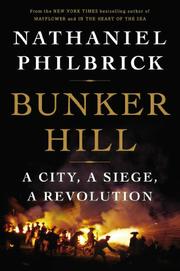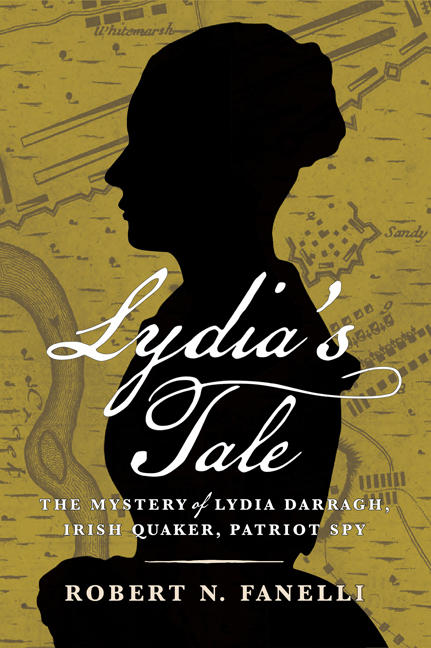 We have another exciting book giveaway for our loyal readers — this time an autographed copy of Bunker Hill: A City, A Siege, A Revolution (Viking, April 30, 2013) by Nathaniel Philbrick. To enter, simply leave a comment below before noon EST on Monday, April 15.
We have another exciting book giveaway for our loyal readers — this time an autographed copy of Bunker Hill: A City, A Siege, A Revolution (Viking, April 30, 2013) by Nathaniel Philbrick. To enter, simply leave a comment below before noon EST on Monday, April 15.
Philbrick, the New York Times bestselling author of Mayflower and In the Heart of the Sea, “reconstructs the revolutionary landscape — geographic and ideological — in a mesmerizing narrative of the robust, messy, and blisteringly real origins of America,” according to Viking’s press announcement.
“No one has told this tale better.” –Publishers Weekly
“Philbrick… will be a candidate for another award with this ingenious, bottom-up look at Boston from the time of the December 1773 Tea Party to the iconic June 1775 battle… A rewarding approach to a well-worn subject, rich in anecdotes, opinion, bloodshed and Byzantine political maneuvering.” –Kirkus
The book caused a major media (traditional and social) stir recently with word that Ben Affleck and Warner Bros. purchased the film rights. It’s not a sure thing, but we’re already helping with casting. In addition to the giveaway, Journal of the American Revolution will publish its review the week of April 29 along with our exclusive no-holds-barred author interview. In the meantime, below is some more promotional background about the book.
For most of us the American Revolution is about the Founding Fathers, the Declaration of Independence, and how George Washington led the colonies through the decade-long struggle that ultimately led to the formation of the United States. Lost in this account of the slow march toward liberty is the truly cataclysmic nature of how the revolution began: The interplay of ideologies and personalities that provoked a group of merchants, farmers, artisans, and sailors to take up arms against their own country. With his precise sense of the unexplored side of mythic events, Philbrick turns his keen eye to pre-Revolutionary Boston — a city of 15,000 inhabitants packed onto a land-connected island of just 1.2 miles — and the gradual up-tick of tension that climaxed in June 1775 with the Battle of Bunker Hill, the first major battle of what became the American Revolution and the War of Independence.
In Bunker Hill, Philbrick brings a fresh perspective to every aspect of the story. As it turns out, the triumvirate of Founding Fathers generally associated with Boston — John Adams, Sam Adams, and John Hancock — was far from the scene when the city erupted. The real work of choreographing the Revolution’s outbreak was done by a 33-year-old physician named Joseph Warren, who emerged as the on-the-ground leader of the Patriot cause. Warren gave William Dawes and Paul Revere the orders to send out the alarm that British troops were headed to Concord; Warren remained in the city until the last possible moment, then joined the fighting as the British soldiers retreated back to Boston. Soon after, Warren was elected President of the Massachusetts Provincial Congress even as he surprised the organization of the nascent Continental Army.
The real central character in this story is Boston, where vigilantes fill the streets with a sinister and frightening violence even as calmer patriots struggle to see their way to rebellion. The action of the book tracks in detail the 18 months following the Boston Tea Party (Dec. 1773), as Boston turned from the center of patriot defiance to a British-occupied city under a patriot siege. Through storied events such as the skirmishes at Lexington and Concord, Philbrick builds to the extraordinary moment in American history when a group of ordinary citizens stood up to several regiments of British regulars as the Battle of Bunker Hill. This is the great tipping point, the bloodiest engagement of the Revolution when several hundred citizen soldiers had the bravery and discipline to hold their fire until the British soldiers, each one with a bayonet mounted to the barrel of his musket, marched to within 15 yards of the patriot entrenchment. Only then, once they could see “the whites of their eyes,” did the rebels fire, ultimately killing or wounding almost half the British force. Not until the third British charge did the Americans retreat, and only then because they had run out of ammunition. With this single battle, the ultimate course of the American Revolution had been foretold.
Leave your comment below to be entered to win this book! Monday afternoon (April 15) we will randomly select the winner and notify them via the comments below. Good luck!








12 Comments
I am extremely excited to read Mr. Philbrick’s book. It’s unfortuante that such an important topic as the American Revolution receives such a top level assessment in history classes across this country. I learned more about it from your Journal, website, and other works than I did in any course taken – high school or college. I look forward to reading this account and discovering more about the true heroes and founders of the cause.
A member of the Sons of the American Revolution, Sons of the Revolution and the Society of the Cincinnati; you might say I’m a Rev War buff. I would be thrilled to own a signed copy of this book. I own Philbrick’s Mayflower and am very anxious to read this novel. It’s also exciting to think that it may be made into a movie. Considering Affleck’s success with Argo, I’m sure this movie would do well and revive interest in this important struggle which is the foundation of the American experience.
Anything American Revolution I eat up. I love it! I am studying to be a Middle School teacher so anything on the American Revolutionary period is helpful and exciting to me! I can’t wait to read this book – it sounds like it’ll be a good, engaging book.
I am very much looking forward to this book. If this is made into a film, hopefully it is not Hollywood “sanitized’. Surprisingly there are so few films that take place from this era.
Also, looking forward to the new Ellis book in June!!!!
Joel
I would be thrilled to have an autograph copy of this book. Philbrick’s books are an Americana treat in which the reader journeys back in time with the heart of what struggle forged our early birth as a nation.
I have looked at the book and found the presentation of facts and up-to-date findings perfect for any who wants to know exactly what happened. It is a reference book worth having in your library. This book falls under the heading of “If you want to safeguard our History, tell the truth.”
I have added this book to my reading list which is getting longer every day it seems, especially with the just concluded contest over on The Junto. I have to say this site is simply outstanding. The information here is splendid. I hope to have one of my papers published here in the near future as well. What I really think is important is that the writing style here is not stiff and formal, but accessible for all readers while maintaining high academic scholarship. If only more historians would understand that writing for an miniscule audience is resulting in a perception of disconnect for our profession.
We’re long overdue for a good movie about the American War of Independence. Mel Gibson’s “The Patriot” was an historical disaster. Al Pachino’s “Revolution” was better, but still left viewers in the dark.
This was a fascinating battle. Most people mistakenly think that the Brits charged up Bunker’s (or Breed’s, if you prefer) Hill three times that day. In reality, the first two assaults were not on the hill. The Brits first tried marching a force along the river side, where the bank hide them from site. A restless Patriot leader found the concealed route and threw up a hasty defense, stopping and turning back the Brit’s flanking movement. Next, the Brits tried attacking across an open field on flat terrain, but musket fire from Patriot defenses on the hill decimated their left flank. Finally, the Brits made the disasterous decision to assault the hill itself. Their first assault on the hill was repulsed with great loss of life to the Redcoats. The Brits only succeeded in their second assault on the hill (the fourth assault of the day) because the Patriots had run out of powder and were unable to continue the defense.
I am a history buff especially Amerian history. I couldn’t agree more with Alan Smiley that a movie on this subject is LONG overdue and that the Patriot was a disaster historically speaking. I have spent the last ten years studying the American Revolutionary War to write my novel The King’s Shilling which I recently self-published. I read the overview of Bunker Hill and it is spot on. It passes the Cheri Waters inspection. LOL! I hope to win this book, but if I don’t you can bet I’m going to purchase it to add to my little library on American history.
Being of fan of Melville, “Moby-Dick; or, The Whale,” and the age of sail, I’ve read “In the Heart of the Sea.” I’ve also read his “Why Read Moby-Dick?” and “Sea of Glory,” the latter about the U.S. antarctic exploring expedition of 1838-42. Mr. Philbrick’s books are easy to read and feature rather detailed indexes. For those who want additional information, he includes extensive and detailed pages of notes, sources cited, and further reading. If his “Bunker Hill” is anything like his previous works, we are in for a treat.
I am so happy to see that this time in history has finally gotten noticed in a big way. In the past it has been spotty and not very acurate. But now we have a ton of things in the media to watch, read and listen to. Being from Boston originally I remember many of the places found in the many books and films. Weather I win this book or not, I will be purchasing it. It would just be so much more fun having an autographed copy.
I love American history. I have a special reason for wanting to read this book. As per family lore, one of my ancestors fought at Bunker Hill. I tried hard but could never find out which one. Now I would just love to learn more about the battle. It must have been really terrible for so many to die.
CarolNWong(at)aol(dot)com